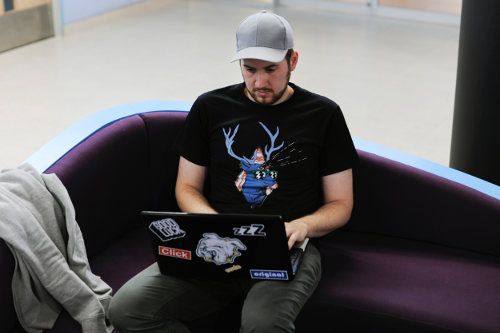Maybe you’re a computer science student with only three months of college left, ready to start your programming career. Or you’ve been interested in tech for some time, hoping to shift gears to a programming career.

photo credit: Soumil Kumar / Pexels
Whether you want to become a software developer, systems analyst, or data scientist, programming jobs are poles-apart from what you learn in class. Therefore, never rely on what your school or professors taught. Instead, be responsible enough to learn essential concepts and programming languages on your own.
Setting foot in programming is not just about gaining hard skills. You also need soft skills to make it past the recruitment process and work with your teammates.
But, if you’re clueless about where to start, consider these eight tips.
1. Learn to code
The first and the most basic rule of starting a programming career is to learn to code. There are numerous programming languages to learn, not just those your college or online Bootcamp taught. The same is true with frameworks and different tools developers use – they keep changing, so you must be eager to learn.
But before you start a course on HTML or JavaScript, you must understand coding. Starting a programming career without knowing how to code is like wanting to become a French language instructor without knowing a single word of French.
Coding is what drives every career in many tech fields. So, if you’re learning coding for the first time, familiarize yourself with basic concepts like variables, syntax, and data structures, and practice working with various tools for writing code.
2. Learn programming languages
To successfully start a programming career, whether in the corporate world or as a freelancer, familiarize yourself with the programming languages. For instance, if you’re more hinged to the data science side, you must have a firm grasp of Python, R, and SQL, among other programming languages and concepts.
If you aren’t sure about a specific path, ask yourself why you want to start a programming career. For example, do you want to create websites? Or, are you fascinated by the complex process of creating software? Every field requires proficiency in a different language. For instance, you must know HTML5, Javascript, and CSS for web development or C, C++, Java, and Swift for mobile applications.
There are plenty of online boot camps, coding classes, and free tutorials and resources on the web to learn programming languages.
3. Learning doesn’t stop
Once you’ve mastered the basics of coding, become proficient in a couple of programming languages, and even landed a reputable corporate job or freelancing gigs, don’t stop learning. Changes occur daily and rapidly in programming, software, and data. Not just languages but programming frameworks keep changing, and you must learn them as they evolve. Your work might become redundant if you keep using old ways, concepts, and tools on new projects.
Also, given the nature of the corporate world and job sector, a lack of updated skills may cause you to lose your job. Keep learning new languages and technologies to stay active in your role as a programmer.
4. Create a portfolio
If you’re making a career switch or just starting in the field, you will need a little more than a list of hard skills on your resume. Every computer science student would more or less have the same set of skills on their resume or cover letter. Applying those skills or knowledge while still enrolled in your studies will differentiate you from the rest.
Creating a portfolio and side projects is even more critical if you come from a different career path. Your employer or client must know how well you can apply what you have learned. Maybe create a website or application or get an internship to get hands-on experience with programming and development. Showcasing a portfolio is evidence of your interest in and eagerness for the field.

5. Learn unit testing
Unit testing is a crucial skill that software developers and folks interested in programming should learn. It helps detect defects in small units within an application or project individually.
If you studied computer science in college, you might already know this. In that case, know that it’s a handy skill. However, if you didn’t go to college or have no formal education in programming, learn unit testing as soon as possible.
It helps improve your code’s quality by writing effective unit tests so that you can detect errors before it’s too late to fix them. It also saves time for everyone who’s working on the project, especially if you’re in a team.
6. Be open-minded
If you’re eager to work alongside other programmers or developers in the corporate sector or an organization. In that case, you must work on your team-building skills and be open-minded. Sometimes you will have to make decisions for the entire team, and other times, you might have to go along with whatever the project lead suggests.
No matter what the situation is, be open-minded. It is important to be appreciative of everyone’s ideas and opinions. Also, try to appear approachable and helpful to your team members; after all, you’re working on the same project. Even the slightest miscommunication can cause irreversible errors.
7. Know when to say “no.”
At the beginning of your career, it is tempting to say “yes” to new opportunities and projects even if they seem out of your comfort zone and reach. Know that you have a life outside work – personal time, socialization, and taking care of your health.
It is easy to say yes to work for fear of disappointing your seniors or team leads. However, it’s not smart to jeopardize your health for work. Say no when you think the scope of a project is more than what you can handle.
If you’re working as a freelancer, set a limit on your weekly working hours and only take on projects you’re interested in.
8. Get your code reviewed
As a beginner developer or analyst, getting feedback on your work, especially your code, is a smart decision. Find industry seniors or team leads at your workplace and ask them for feedback on your coding and other skills. Make sure to work on bettering yourself and your skills.
Good and bad codes are easy to differentiate. If your code is a mess and complex for other programmers to understand, you may have to improve your skills.
A successful programming career isn’t just about learning how to code. You need to constantly improve it by making it more readable, eliminating the mess, and making it more understandable.

Conclusion
As a beginner programmer or developer, it is easy to feel overwhelmed by the number of concepts, languages, and tools you may have to master. But that doesn’t make acquiring a career in programming impossible. Depending on where you start from, it can be slightly complex, but with a focus on soft and hard skills, it is possible to kick-start a career in programming.
Make sure to learn code, create side projects, and acquire skills like problem-solving and team-building.